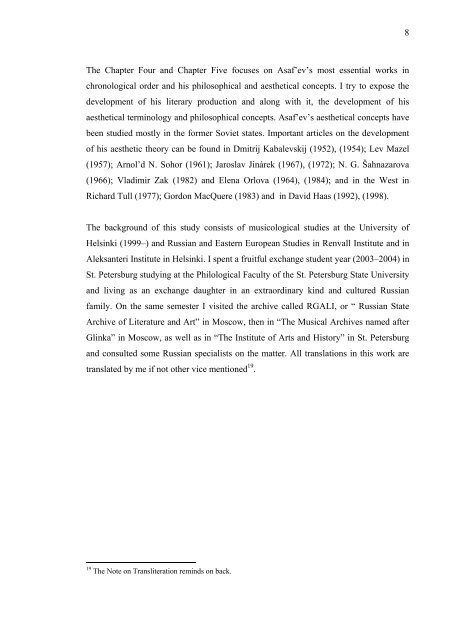Boris Asaf'ev and the Soviet Musicology - E-thesis
Boris Asaf'ev and the Soviet Musicology - E-thesis
Boris Asaf'ev and the Soviet Musicology - E-thesis
Create successful ePaper yourself
Turn your PDF publications into a flip-book with our unique Google optimized e-Paper software.
The Chapter Four <strong>and</strong> Chapter Five focuses on Asaf’ev’s most essential works in<br />
chronological order <strong>and</strong> his philosophical <strong>and</strong> aes<strong>the</strong>tical concepts. I try to expose <strong>the</strong><br />
development of his literary production <strong>and</strong> along with it, <strong>the</strong> development of his<br />
aes<strong>the</strong>tical terminology <strong>and</strong> philosophical concepts. Asaf’ev’s aes<strong>the</strong>tical concepts have<br />
been studied mostly in <strong>the</strong> former <strong>Soviet</strong> states. Important articles on <strong>the</strong> development<br />
of his aes<strong>the</strong>tic <strong>the</strong>ory can be found in Dmitrij Kabalevskij (1952), (1954); Lev Mazel<br />
(1957); Arnol’d N. Sohor (1961); Jaroslav Jinárek (1967), (1972); N. G. Šahnazarova<br />
(1966); Vladimir Zak (1982) <strong>and</strong> Elena Orlova (1964), (1984); <strong>and</strong> in <strong>the</strong> West in<br />
Richard Tull (1977); Gordon MacQuere (1983) <strong>and</strong> in David Haas (1992), (1998).<br />
The background of this study consists of musicological studies at <strong>the</strong> University of<br />
Helsinki (1999–) <strong>and</strong> Russian <strong>and</strong> Eastern European Studies in Renvall Institute <strong>and</strong> in<br />
Aleksanteri Institute in Helsinki. I spent a fruitful exchange student year (2003–2004) in<br />
St. Petersburg studying at <strong>the</strong> Philological Faculty of <strong>the</strong> St. Petersburg State University<br />
<strong>and</strong> living as an exchange daughter in an extraordinary kind <strong>and</strong> cultured Russian<br />
family. On <strong>the</strong> same semester I visited <strong>the</strong> archive called RGALI, or “ Russian State<br />
Archive of Literature <strong>and</strong> Art” in Moscow, <strong>the</strong>n in “The Musical Archives named after<br />
Glinka” in Moscow, as well as in “The Institute of Arts <strong>and</strong> History” in St. Petersburg<br />
<strong>and</strong> consulted some Russian specialists on <strong>the</strong> matter. All translations in this work are<br />
translated by me if not o<strong>the</strong>r vice mentioned 19 .<br />
19 The Note on Transliteration reminds on back.<br />
8

















